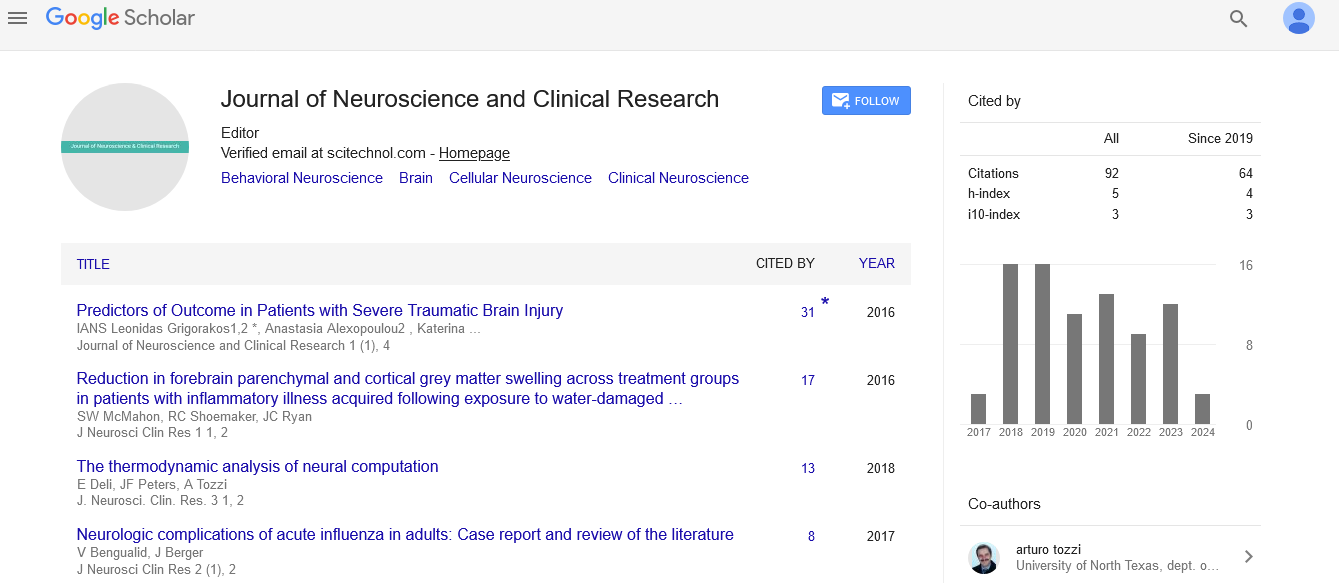A Case of De Novo Psoriasis Secondary to Nivolumab in a Patient with Metastatic Renal Cell Carcinoma
Supriya Koya
Genesis Care, USA
: J Neurosci Clin Res
Abstract
Psoriasis is typically a skin condition characterized by inflammatory patches, plaques and scaly skin. Psoriasis affects other organs including joints with its association noted with Diabetes, Parkinson’s disease, Nonalcoholic fatty liver etc. Though autoimmune etiology was proposed to be involved in its pathogenesis, true cause is not fully understood. More recently, in the quest for understanding the molecular pathogenesis of psoriasis investigations uncovered the connection between nervous system and immune system in the pathogenesis of psoriasis. Nociceptive sensory neurons, an integral part of peripheral nervous system in the skin are in close proximity to dermal dendritic cells (DDC) that are components of dermal immune system. RiolBlanco, Lorena, et al. Nature 510.7503 (2014) in preclinical mouse models have shown that activation of nociceptive sensory neurons leads to secretion of IL-23 by DDCs that causes skin inflammation characteristic of psoriasis. In turn they have also shown dermal γδT17 cells triggered by IL-23, secrete inflammatory cytokines and recruit more inflammatory cells to the skin leading to more skin inflammation characteristic of psoriasis [1] We present here a clinical model or a case report that further strengthens the concept of cross talk between nervous system and immune system that is involved in pathogenesis of de novo psoriasis. Programmed cell death protein 1 (PD-1) is an immune checkpoint molecule. Immune checkpoint inhibitors like Nivolumab block the interaction between PD-1 and PD ligand-1, stimulating the T-cell activity and helping the anticancer host immune response. The blockage of the PD-1 pathway while it helps for cancer treatments, it is thought to cause immune-mediated adverse events such as organ-specific side effects and cutaneous side effects [2]. We report a case of a de-novo moderate to severe palmoplantar pustular psoriasis as a side effect from nivolumab (PD-1 inhibitor) in a renal cell carcinoma patient. A 66-year-old male with a past medical history of metastatic renal cell carcinoma presented with progressive rash while on Nivolumab.
Biography
Supriya Koya is Medical Oncologist and Hematologist. She is the director of Medical Oncology clinic in Ponca City, Oklahoma. Her abstracts accepted and presented at ACP (American College of Physicians) 2006, SGIM ( Society of general internal medicine ) 2007, ASCO ( American Society of Oncology ) 2009, ASH( American Society of Hematology) 2011. Dr Koya has been selected as Top Oncologist and Hematologist in Oklahoma, USA for the year 2021. Dr Koya is also the reviewer for medical journals like British Medical Journal (2022).
 Spanish
Spanish  Chinese
Chinese  Russian
Russian  German
German  French
French  Japanese
Japanese  Portuguese
Portuguese  Hindi
Hindi 